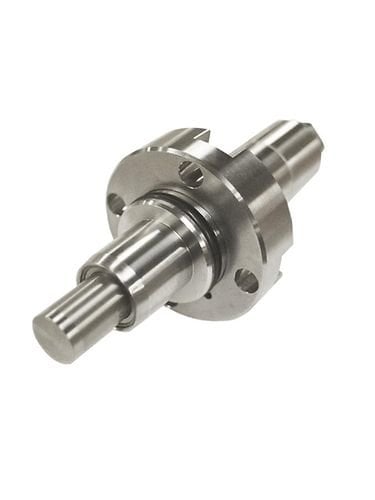www.magazine-industry-usa.com
21
'20
Written on Modified on
Industry’s First Ultrasonic Transducer with Metal 3D-Printed Mini-Horn Array Enhances Flow Meter Performance
Emerson’s titanium-housed gas ultrasonic transducer delivers enhanced performance and long-term reliability in extreme wet, sour and corrosive chemical gas environments.

Emerson has released the Daniel T-200, a titanium-housed transducer, for its gas ultrasonic flow meter product line, marking the first use of metal 3D printing to enhance the acoustic performance of ultrasonic flow meters in custody transfer applications. The T-200’s robust design provides increased reliability, uptime and safety while achieving the highest accuracy class attainable in gas measurement.
In an ultrasonic flow meter, transducers generate acoustic signals that are sent back and forth across the fluid stream. The arrival times of these signals determine the fluid flow velocity. Signal quality and strength are critical to measurement accuracy, which is paramount in custody transfer applications. An error of only 0.1% can equate to hundreds of thousands of dollars annually in a large diameter high pressure pipeline.
To boost signal strength through the titanium housing, the T-200 uses a metal 3D-printed mini horn array, which consists of an intricate geometrical structure of titanium horns and a titanium diaphragm that acts as a harmonic oscillator and matching layer. This maximizes the sound energy coupled into the gas, which improves the signal-to-noise ratio and accuracy of the measurement.
“The T200’s mini-horn array could not be made without metal 3D printing technology, making it transformational to the sound quality and performance achievable through a titanium barrier,” said Kerry Groeschel, director of ultrasonic technology, Emerson. “Emerson is committed to developing innovative solutions that help our customers achieve safer, more efficient operations.”
The meter’s all-metal housing provides a barrier from corrosive hydrocarbon fluids and wet gas, thereby extending the life of transducer components and ensuring stable performance. This unique design allows the meter to be hydrotested with transducers in place, steam cleaned while in the operating line and blown down with no limits on the rate at which the meter can be depressurized.
The T-200 can also be safely extracted while the meter is under pressure without special high-pressure extraction tools, which reduces the possibility of greenhouse gas emissions during extraction. The capsule which contains the piezoelectric crystal used to produce ultrasonic sound waves is retractable as a single piece for simplicity and ease of use. No other gas ultrasonic transducer can be extracted under pressure without special tools and with so few parts to remove or touch in the removal process.
The new design is rated for a wide range of operating conditions, including pressures from 15 pounds per square inch gauge (psig)/103 Kilopascal (kPa) to 3,750 psig/25,855 kPa and temperatures up to 125 degrees Celsius/257 Fahrenheit.
www.emerson.com

